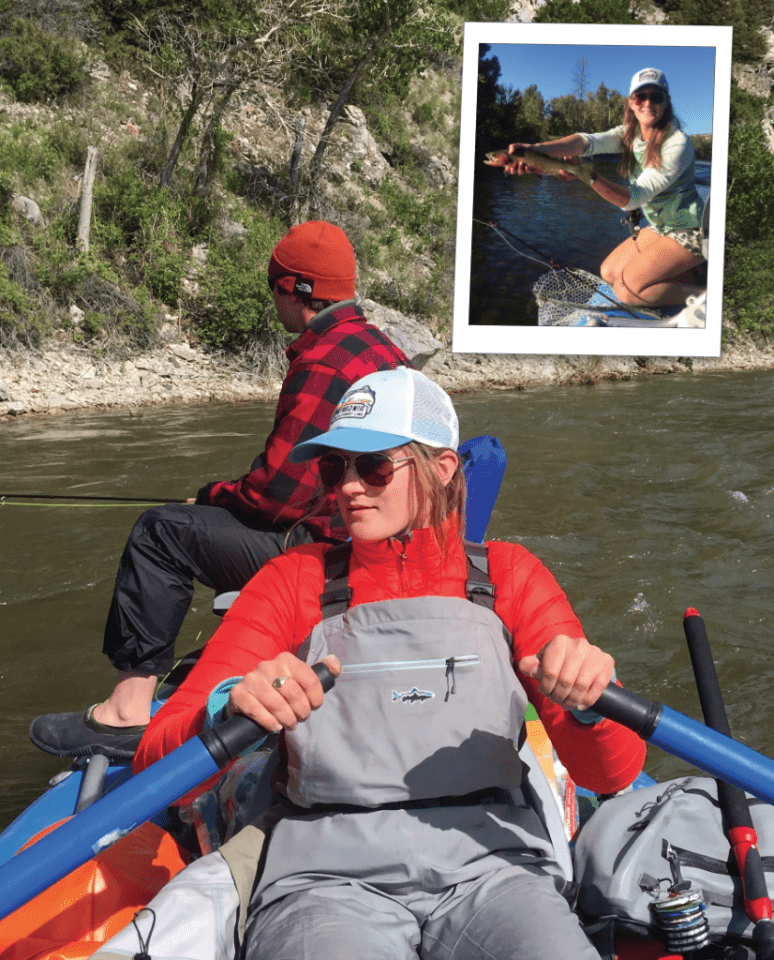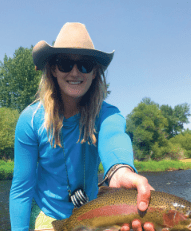Fly Fishing: From First Cast to Professional Angler
By Stephanie Winter
Fly fishing is my business and my passion, and I’m known to get a little too enthusiastic when explaining the feeling of watching a trout sip a dry fly off a pristine stream. As a fly fishing guide, it’s my job to not only to put clients on fish, but instruct them on entomology, reading the river and casting, helping them become better anglers. I spend quite a bit of time on the water teaching clients, friends and family how to cast and catch fish. Here are a few tips if you are interested in fly fishing, but don’t know how to begin:
1. See if you like it.
The first and best thing you can do is to go fly fishing with someone who knows what they’re doing. Whether that be a guide or a friend, have someone help you so you’re not left completely clueless standing in a river. If you don’t know anyone who fly fishes, try going to an Orvis store, or yourlocal fly shop and ask about casting lessons. Taking casting lessons will not only allow you to gather knowledge, but also meet other beginners and professionals who are interested in the sport.
2. Choosing Equipment
I’m a big proponent of borrowing a fly fishing set up before you buy your own ensuring you like the sport before you drop a hefty chunk of change on equipment. But once you’ve decided fly fishing is for you it’s important to buy the right equipment. Make sure you talk to someone at a fly shop about the right rod, reel, and fly line before you make a purchase. Blindly choosing a setup online can end up costing you a lot of money for the wrong products. You don’t need the fanciest, most high-tech equipment available but you need the basics. A five or six weight is good when fishing freshwater for trout, bass and panfish. An eight to ten weight works well for saltwater when fishing for Stripers, False Albacore, Bonefish, Redfish and in freshwater for Pike, Muskie, Steelhead and Salmon.
Choosing a high quality reel is more important when fishing for heavier fish as you will put fish “on the reel” more frequently. When buying a saltwater setup, a sealed drag will slow the corrosive elements of saltwater but will not stop corrosion completely. Remember to rinse all of your equipment after use in saltwater. When you buy a reel, buy a fly line and backing as well allowing the retailer to set up the reel then and there. When they set up the reel, most likely if you are right-handed you will be left-hand retrieve and vice versa. Picking up combo setup is generally the easiest and most economical path if you don’t want to choose your fly rod, reel and line separately. Combo setups include a rod, reel, fly line and backing.
Other essential equipment you’ll need is leader (9ft 3x or 4x for freshwater, 20 lb. test for saltwater), tippet, nippers (can use fingernail clippers), forceps or needle nose pliers and a fly box.
3. Picking Flies

nch knot which is easy and fast.
4. Practice
Before you head out to the shore or river, set up a few hula hoops or other targets and cast without a fly on your lawn. Nothing is worse than being surrounded by fish without the skill to get your fly to the right spot. Know that fly fishing isn’t a sport that can be perfected overnight. It will take time, practice and patience before you start to feel a mastery of the sport.
5. Learn to read the water
Finally, learning to read the water is essential in learning how to fly fish. The best methods to learn water are to hire a guide to show you the good water, or do a lot of trial and error fishing yourself. When you get to a body of water, don’t immediately start casting. Sit on the bank or shore and set up your rod, taking the time to monitor any activity. A good fisherman observes more than he casts.
Stephanie Winter is a fly fishing guide at Big Hole Lodge in Wise River, MT. Find the lodge at flyfishinglodge.com and more fish pics on her instagram @stephrwinter.
